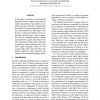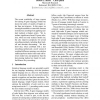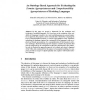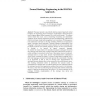1380 search results - page 50 / 276 » Decomposable Modeling in Natural Language Processing |
EMNLP
2009
14 years 7 months ago
2009
Randomised techniques allow very big language models to be represented succinctly. However, being batch-based they are unsuitable for modelling an unbounded stream of language whi...
EMNLP
2009
14 years 7 months ago
2009
In this paper we propose a novel statistical language model to capture long-range semantic dependencies. Specifically, we apply the concept of semantic composition to the problem ...
EMNLP
2009
14 years 7 months ago
2009
The recent availability of large corpora for training N-gram language models has shown the utility of models of higher order than just trigrams. In this paper, we investigate meth...
UML
2005
Springer
15 years 3 months ago
2005
Springer
In this paper we present a framework for the evaluation and (re)design of modeling languages. We focus here on the evaluation of the suitability of a language to model a set or rea...
COOPIS
2002
IEEE
15 years 2 months ago
2002
IEEE
This paper presents a specifically database-inspired approach (called DOGMA) for engineering formal ontologies, implemented as shared resources used to express agreed formal semant...




